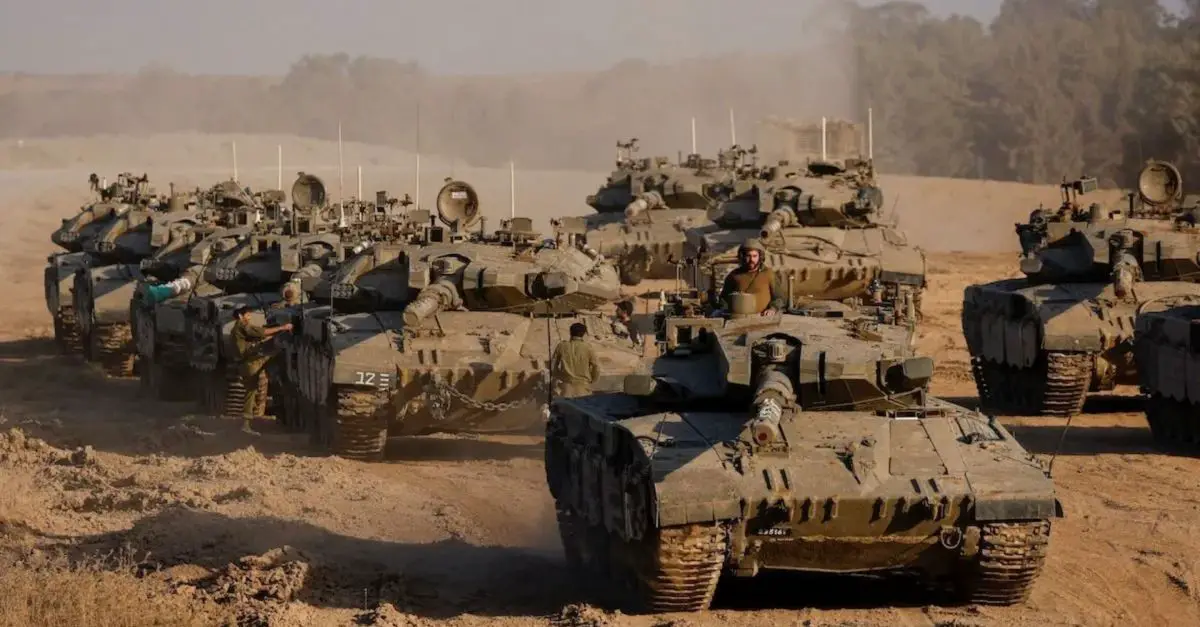Breaking News
ANALYSIS : Despite the risks, the war in southern Lebanon remains an opportunity for Israel.
There are also significant strategic questions, such as the support of the United States and the reaction of the international community in the event that Israel launches a coordinated attack on Iranian nuclear sites and against Hezbollah forces in southern Lebanon. It is not excluded that Israel finds itself at a disadvantage facing a multitude of enemies in a multi-front war.
Follow Army Recognition on Google News at this link

An Israeli soldier stands in a tank, amid the ongoing conflict between Israel and Hamas, near the Israel-Gaza border, in Israel, June 4, 2024(Picture source: Amir Cohen )
However, exchanges of fire between the Israeli Defense Forces and Hezbollah have been, in most cases, slightly less intense than in recent months. This has not really eased concerns in Israel and Lebanon.
The persistent absence of a diplomatic solution to the conflict, which began when Hezbollah fired on Israel following the Hamas massacre at the Gaza border last October, the mutual exchange of threats, and the inability to dissociate what is happening in Lebanon from the war in Gaza, have all increased anxiety about war. As a result, rumors, alarmist and futile theories are freely circulating.
Some Israeli government ministers have made statements that do nothing to calm the situation. Finance Minister Bezalel Smotrich, a member of the security cabinet, outlined what a regional offensive might look like.
He proposed "the collapse of the regime in Iran, the complete destruction of Hamas, and a quick and fierce war against Hezbollah" that would eliminate the Shiite organization from the game.
Today several questions arise:
-
What does a reservist feel when he is called up for the third time and must leave his family, his struggling business, and his studies?
-
How many munitions does the Israeli Air Force actually have while the Biden administration has delayed the delivery of 3,500 heavy bombs?
-
How will the Israeli home front cope with the thousands of missiles, rockets, and drones fired from Lebanon, probably with the help of Iran and militias it operates and finances in Iraq, Syria, and Yemen?
It seems that Smotrich's scenario combines latent fantasies about the borders of the Promised Land with his long-standing plan to financially strangle the Palestinian Authority and provoke the collapse of its power in the West Bank (an idea on which Prime Minister Benjamin Netanyahu has expressed reservations in statements attributed to him last week).
It is hard to know if the Finance Minister's remarks on Sunday at the Makor Rishon press conference reflect a short-term strategic vision or a more cynical gesture by someone who thinks that a regional Gog and Magog scenario actually advances his goals.
In Lebanon, Netanyahu, and even more so Defense Minister Yoav Galant, have recently issued messages about the need to first seek a diplomatic settlement with American mediation before launching an all-out campaign against Hezbollah.
The region is still waiting to see if Amos Hochstein, the envoy of U.S. President Joe Biden, will soon start a new series of diplomatic shuttles between Beirut and Jerusalem. In the background, there is also Netanyahu's speech to the U.S. Congress on July 24.
In their contacts with the Americans, the Israelis have discussed the possibility that their army might launch an offensive in Lebanon, in the hope that Hezbollah would come to its senses and accept an arrangement that would move its forces north of the Litani River.
The Americans are skeptical: they believe that Hezbollah will respond to any escalation by the IDF with an escalation of its own, and from there, the path to total war would be short.
The main problem the government faces concerns the expectations of the population. On October 8, the state evacuated some 60,000 residents from their homes along the border with Lebanon. So far, no date has been set for their return.
Criticism is mounting in the face of this persistent strategic failure. It comes from the residents of the North, the media, and the opposition. The government spokespersons' response is not convincing.
As long as the current reality remains unresolved, the temptation for the government and the army to try to break the deadlock with a military operation grows, despite the obvious risks.


























